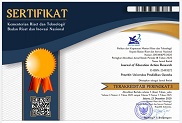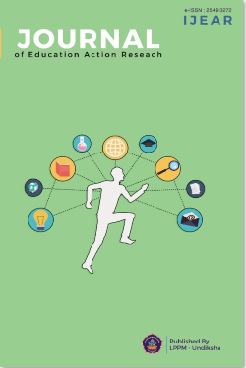Application of the Jigsaw Cooperative Learning Model Oriented Towards Improving High School Student Learning Outcomes
DOI:
https://doi.org/10.23887/jear.v8i1.60744Keywords:
Cooperative learning, Jigsaw, Physics Learning Outcomes, CARAbstract
The problem often encountered in learning is students' low motivation and learning outcomes. This is caused by learning that does not provide opportunities for students to improve their thinking and argumentation skills. This study aims to apply the Jigsaw-Oriented Cooperative Learning Model to the Learning Outcomes of High School Students. This type of research is class action research. The Classroom Action Research used in this study is a model developed by Kemmis and McTaggart. The Classroom Action Research was conducted in two cycles, each with 2 meetings. The number of students involved was 36, consisting of 22 (61%) female and 14 (39%) male. Data collection methods used observation, interviews, and tests. The instruments used to assess students' physics learning outcomes in each cycle were multiple-choice questions. Data was analyzed using qualitative and quantitative descriptive analysis. The study results show that after two research cycles, actions were carried out that showed an increase in student learning outcomes, individually and collectively. The average student learning outcomes increased from 79.8 to 81.1. The number of students who completed was 75% to 83.3%. Therefore, using a cooperative learning paradigm such as Jigsaw can improve students' understanding of physics. It is concluded that the Jigsaw Type Cooperative Learning Model can improve the learning outcomes of high school students.
References
Adam, D. H., Irmayanti, Hasibuan, M. N. S., Hasibuan, E. R., & Nazliah, R. (2010). Pengaruh Model Pembelajaran Kooperatif Tipe Jigsaw Untuk Meningkatkan Hasil Belajar Siswa. Jurnal Education And Development, 9(2), 437–439. http://dx.doi.org/10.24127/ajpm.v9i2.2704.
Aminuddin, A., Harahap, A. S., & Dawi, M. N. (2021). Sistem Finansial Pendidikan di Indonesia (Analisis Tentang Signifikansinya Terhadap Pengelolaan Human Capital). Hikmah, 18(2), 119–130. https://doi.org/10.53802/hikmah.v18i2.125.
Ardiawan, I. K. N., Kristina, P. D., & Swarjana, I. G. T. (2020). Model Pembelajaran Jigsaw Sebagai Salah Satu Strategi Pembelajaran PKn di Sekolah Dasar. Edukasi: Jurnal Pendidikan Dasar, 1(1), 57–63. https://doi.org/10.55115/edukasi.v1i1.528.
Arta, I. M. (2021). Penerapan Model Pembelajaran Kooperatif Tipe Jigsaw Untuk Meningkatkan Hasil Belajar IPS Siswa Kelas V SD Negeri 4 Tenganan Semester II Tahun Pelajaran 2018/2019. ACTION : Jurnal Inovasi Penelitian Tindakan Kelas dan Sekolah, 1(1), 9–21. https://doi.org/10.51878/action.v1i1.283.
Baeti, N., Sowanto, S., Silviana, D., & Aryaningsyih, S. (2021). Pemberantasan Buta Aksara Sebagai Upaya Peningkatan Kualitas Sumber Daya Manusia (SDM) di Kelurahan Penatoi Kecamatan Mpunda Kota Bima. Bima Abdi: Jurnal Pengabdian Masyarakat, 1(1), 45–50. https://doi.org/10.53299/bajpm.v1i1.42.
Budiarti, R. P. N., Rulyansah, A., Rihlah, J., Mardhotillah, R. R., & Nurfaiza, Y. I. (2022). Pelatihan Pembelajaran Aktif di Sekolah Dasar: Sebuah Experiential Learning sebagai Upaya Mewujudkan Potensi Pembelajaran Aktif. Indonesia Berdaya, 4(1), 77–84. https://doi.org/10.47679/ib.2023379.
Darmadi, H. (2015). Tugas, Peran, Kompetensi, dan Tanggung Jawab Menjadi Guru Profesional. Edukasi: Jurnal Pendidikan, 13(2), 161–174. https://doi.org/10.31571/edukasi.v13i2.113.
Hastuti, W. (2022). Peningkatan Aktivitas Dan Hasil Belajar Biologi Materi Enzim dan Metabolisme Sel Menggunakan Model Pembelajaran Kooperatif Tipe Jigsaw Siswa Kelas XII Mia SMAN 1 Tebing Tinggi Tahun Pelajaran 2021/2022. Innovative: Journal Of Social Science Research, 2(1), 696–702. https://doi.org/10.31004/innovative.v2i1.4579.
Heriwan, D., & Taufina, T. (2020). Pengaruh Model Pembelajaran Jigsaw terhadap Hasil Belajar Bahasa Indonesia di Sekolah Dasar. Jurnal Basicedu, 4(3), 673–680. https://doi.org/10.31004/basicedu.v4i3.416.
Kahar, M. S., Anwar, Z., & Murpri, D. K. (2020). Pengaruh Model Pembelajaran Kooperatif Tipe Jigsaw Terhadap Peningkatan Hasil Belajar. AKSIOMA: Jurnal Program Studi Pendidikan Matematika, 9(2), 279–295. https://doi.org/10.24127/ajpm.v9i2.2704.
Kasrianti, A., Sahidu, H., & Verawati, N. N. S. P. (2022). Pengembangan Perangkat Pembelajaran Model Kooperatif Tipe Jigsaw untuk Meningkatkan Motivasi Belajar Fisika Peserta Didik. Jurnal Ilmiah Profesi Pendidikan, 7(2b), 741–746. https://doi.org/10.29303/jipp.v7i2b.688.
Kemmis, S., & McTaggart, R. (1988). The Action Research Planner. Deakin University Press.
Mulana, I. M. B. (2022). Penerapan Model Pembelajaran Kooperatif Tipe Jigsaw Untuk Meningkatkan Disiplin Dan Prestasi Belajar Matematika Siswa Kelas Xi Mipa 4 Sma Negeri 4 Singaraja Pada Semester Ganjil Tahun Pelajaran 2021/2022. Daiwi Widya, 9(1), 54–70. https://doi.org/10.37637/dw.v9i1.1008.
Muthaharoh, S., & Sukarelawan, M. I. (2023). Using the problem-based learning model, improving high school students' research skills through light diffraction experiments. Jurnal Riset dan Kajian Pendidikan Fisika, 10(2), 64–71. https://doi.org/10.12928/jrkpf.v10i2.566.
Nashiroh, P. K., Ekarini, F., & Ristanto, R. D. (2020). Efektivitas Penerapan Model Pembelajaran Kooperatif Tipe Jigsaw Berbatuan Mind Map terhadap Kemampuan Pedagogik Mahasiswa Mata Kuliah Pengembangan Program Diklat. Jurnal Pendidikan Teknologi dan Kejuruan, 17(1), 43. https://doi.org/10.23887/jptk-undiksha.v17i1.22906.
Nurhadi, N. (2022). Penerapan Model Cooperative Learning Tipe Jigsaw Untuk Meningkatkan Hasil Belajar Fisika Siswa Sman 3 Bengkalis. SECONDARY: Jurnal Inovasi Pendidikan Menengah, 2(2), 240–249. https://doi.org/10.51878/secondary.v2i2.1147.
Nurhalizah, N., Damayanti, A., Nasution, E. K., Siahaan, S., & Tanjung, I. F. (2022). Penerapan Strategi Pembelajaran Kooperatif Tipe Jigsaw untuk Meningkatkan Keaktifan dan Hasil Belajar Siswa SMA. Edukatif: Jurnal Ilmu Pendidikan, 4(5), 6632–6640. https://doi.org/10.31004/edukatif.v4i5.3424.
Poerwati, C. E., Suryaningsih, N. M. A., & Cahaya, I. M. E. (2020). Model Pembelajaran Kooperatif Tipe Jigsaw II dalam Meningkatkan Kemampuan Matematika Anak. Jurnal Obsesi : Jurnal Pendidikan Anak Usia Dini, 5(1), 281. https://doi.org/10.31004/obsesi.v5i1.496.
Pujiasih, E. (2020). Membangun Generasi Emas Dengan Variasi Pembelajaran Online Di Masa Pandemi Covid-19. Ideguru: Jurnal Karya Ilmiah Guru, 5(1), 42–48. https://doi.org/10.51169/ideguru.v5i1.136.
Resmi, N. W. (2022). Model Pembelajaran Kooperatif Tipe Jigsaw untuk Meningkatkan Hasil Belajar Matematika pada Siswa Kelas IV Sekolah Dasar. Journal of Education Action Research, 6(4), 546–551. https://doi.org/10.23887/jear.v6i4.52106.
Sembiring, S. B. (2021). Penerapan Model Pembelajaran Kooperatif Tipe Jigsaw Untuk Meningkatkan Pretasi Belajar Siswa Pada Pembelajaran Perbankan Dasar Di Kelas X AKL-1 SMK Negeri 1 Kabanjahe Tahun Pelajaran 2018/2019. JS (Jurnal Sekolah), 5(4), 125. https://doi.org/10.24114/js.v5i4.28351.
Septian, A., & Ramadhanty, C. L. (2020). Peningkatan Pemahaman Konsep Matematika Siswa SMP melalui Model Pembelajaran Kooperatif Tipe Jigsaw. Wacana Akademika: Majalah Ilmiah Kependidikan, 4(1), 56. https://doi.org/10.30738/wa.v4i1.7782.
Sewandono, G. (2022). Kompetensi Dasar Menerapkan Hukum-hukum Dasar Kimia dalam Perhitungan Kimia dengan Menggunakan Metode Jigsaw pada Siswa Kelas X TKJ 1 SMK Negeri 1 Udanawu Tahun Pelajaran 2019-2020. Jurnal Pembelajaran dan Riset Pendidikan (JPRP), 2(3), 160–165. https://doi.org/10.28926/jprp.v2i3.448.
Siahaan, T. M., Sianipar, H. F., Simamora, R., Sijabat, A., & Sinaga, C. V. R. (2021). Pengembangan Buku Ajar Berbasis Kooperatif Tipe Jigsaw untuk Meningkatkan Kemampuan Berpikir Kreatif Mahasiswa. Jurnal Basicedu, 5(4), 2496–2503. https://doi.org/10.31004/basicedu.v5i4.1213.
Sobri, S. (2021). Peningkatan Motivasi Dan Hasil Belajar Fisika Materi Gerak Vertikal Dengan Model Kooperatif Tipe Jigsaw Pada Siswa Kelas X Mipa 1 Sma Negeri 1 Petarukan Tahun Pelajaran 2017/2018. Orbith, 17(3). https://doi.org/10.32497/orbith.v17i3.3447.
Sundari, F. (2017). Peran Guru Sebagai Pembelajar dalam Memotivasi Peserta Didik Usia SD. Prosiding Diskusi Panel Pendidikan “Menjadi Guru Pembelajar,” 60–76.
Tuna, R. (2022). Upaya Peningkatan Motivasi Dan Prestasi Belajar Kimia Melalui Implementasi Model Pembelajaran Jigsaw Pada Pembelajaran Laju Reaksi Kelas Xi IPA 1 SMA Negeri 1 Paguat Tahun Pelajaran 2019/2020. Aksara: Jurnal Ilmu Pendidikan Nonformal, 8(1), 333. https://doi.org/10.37905/aksara.8.1.333-342.2022.
Wahab, A. A., Suhartini, S., & Buhaerah, B. (2022). Penerapan Model Kooperatif Tipe Jigsaw terhadap Peningkatan Keaktifan Belajar Matematika. Jurnal Ilmiah Pendidikan Matematika Al Qalasadi, 6(1), 9–15. https://doi.org/10.32505/qalasadi.v6i1.3718.
Wahyudi, W., Cempaka Putri, C. B., & Susilawati, S. (2023). Efektivitas Perangkat Pembelajaran Model Kooperatif Tipe Jigsaw untuk Meningkatkan Hasil Belajar Peserta Didik pada Materi Hukum Newton. Jurnal Ilmiah Profesi Pendidikan, 8(1), 179–183. https://doi.org/10.29303/jipp.v8i1.978.
Widarta, G. M. A. (2020). Penerapan Model Pembelajaran Kooperatif Tipe Jigsaw Untuk Meningkatkan Motivasi Dan Hasil Belajar. Indonesian Journal of Educational Development, 1(2), 131–141. https://doi.org/0.5281/zenodo.4003775.
Winarsih, L. (2021). Meningkatkan Hasil Belajar Kimia Melalui Pembelajaran Kooperatif (Cooperative Leaning) Model Jigsaw Pada Materi Kesetimbangan Larutan (Hidrolisis Garam dan Ksp) Siswa Kelas XI IPA-3 SMA Negeri 1 Karangrejo. Jurnal Terapan Pendidikan Dasar dan Menengah, 1(1), 81–83. https://doi.org/10.28926/jtpdm.v1i1.174.
Wulandari, W., & Jariono, G. (2022). Upaya Meningkatkan Kebugaran Jasmani Menggunakan Model Pembelajaran Kooperatif Tipe Jigsaw. Jurnal Porkes (Jurnal Pendidikan Olahraga Kesehatan & Rekreasi), 5(1), 245–259. https://doi.org/10.29408/porkes.v5i1.
Downloads
Published
How to Cite
Issue
Section
License
Copyright (c) 2024 Sri Suparwati

This work is licensed under a Creative Commons Attribution-ShareAlike 4.0 International License.











